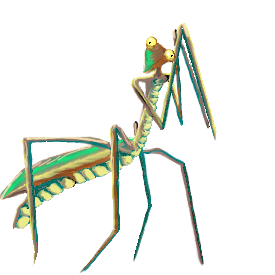Praying mantis
From Wikimalia
| (One intermediate revision not shown.) | |||
| Line 2: | Line 2: | ||
|image=Praying Mantis.png | |image=Praying Mantis.png | ||
|name=Praying Mantis | |name=Praying Mantis | ||
| - | |habitat= | + | |habitat=Forested temperate regions. |
| - | |description= | + | |description=Growing up to eight [[Measurements|thum]]s and a half, this long slender winged insect is one of the most formidable insect in the known world. Its triangular head is highly articulated, capable of turning to spot a full 360 degrees, bringing its large protruding eyes sharply to bear. Frighteningly fast antennae flicker precisely to any environmental stimuli, perceived across astonishing distances. So placed are its six legs as to acquire a nearly humanoid upright posture, its forward legs appear to have a supplicant posture like its cousin the [[Praya mantis|Praying Mantis]]. |
| - | | | + | Their spined forelegs are lined with razor-sharp interlocking hooks, and thickly protected by dense greenish brown chitin. The armor of the mantis changes a wide range of earthy colors, mainly greens, yellows and browns. This highly aggressive and powerful assassin is reputed to become so fierce that its lightning-fast attacks, superhuman patience and generally ruthless behavior are the study of many martial arts forms. |
| - | |notes= | + | The fierce mandibles jutting from the 'snout' are able to pierce almost any defense, including leathery skin, insect chitin, and thin wood. The rear chitin is split over the insect's dual wing set, which are usually a mottled yellow-brown, and the carapace makes a great fluttering noise during flight. Their rear legs are formidable grippers and have been observed to deliver a devastating hind kick. |
| + | |notes=Their prey, for this is surely one of nature's most perfect predators, covers a wide range of the animal kingdom. There is virtually no insect that can withstand them, and the mantises feed on mice, voles, baby birds, lizards and rats. It is probable that their diet also includes frogs, small snakes, spiders and small salamanders. It is a cannibalistic ferocious opponent, and highly opportunistic, making it a deadly natural assassin. | ||
}} | }} | ||
| + | Most know about some of the sexual habits of mantises, including that the female will often eat the male during copulation. and that the female of the species outgrows the male by nearly twenty percent. They are moderately capable of sustained flight, but they seem to prefer to be ground-bound, or tree-bound, wall-bound, as well as camouflaged and motionless when they strike. Praying Mantises will generally live quite long in captivity; some are reputed to have a lifespan of many [[Measurements|cycle]]s. Extra caution must be used if attempting to collect this specie. | ||
{{stub}} | {{stub}} | ||
Back to the [[Insect/Arachnid]] page. | Back to the [[Insect/Arachnid]] page. | ||
Current revision
| The Bug Collection | ||||||||
|---|---|---|---|---|---|---|---|---|
|
| ||||||||
| ||||||||
Most know about some of the sexual habits of mantises, including that the female will often eat the male during copulation. and that the female of the species outgrows the male by nearly twenty percent. They are moderately capable of sustained flight, but they seem to prefer to be ground-bound, or tree-bound, wall-bound, as well as camouflaged and motionless when they strike. Praying Mantises will generally live quite long in captivity; some are reputed to have a lifespan of many cycles. Extra caution must be used if attempting to collect this specie.
This article is a stub. You can help Wikimalia by expanding it.
Back to the Insect/Arachnid page.

